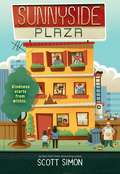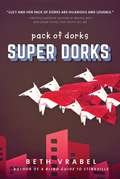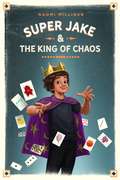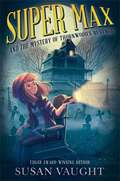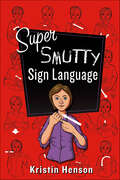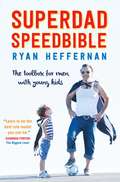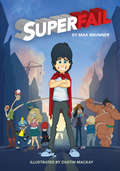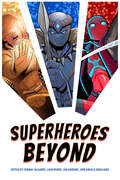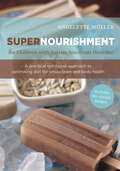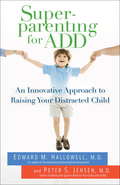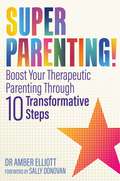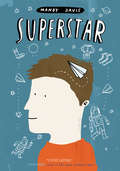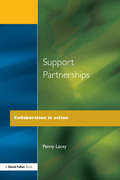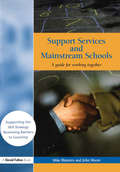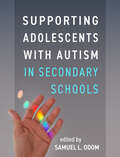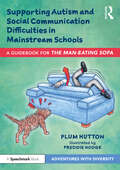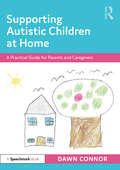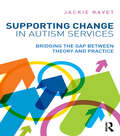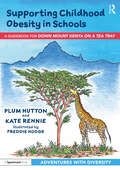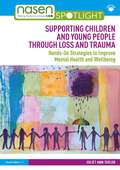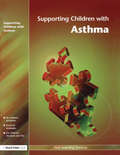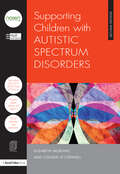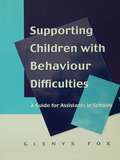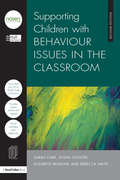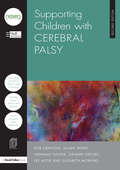- Table View
- List View
Sunnyside Plaza
by Scott Simon<P><P>Wonder meets Three Times Lucky in a story of empowerment as a young woman decides to help solve the mystery of multiple suspicious deaths in her group home. Sally Miyake can't read, but she learns lots of things. Like bricks are made of clay and Vitamin D comes from the sun. Sally is happy working in the kitchen at Sunnyside Plaza, the community center she lives in with other adults with developmental disabilities. <P><P>For Sally and her friends, Sunnyside is the only home they've ever known. <P><P>Everything changes the day a resident unexpectedly dies. After a series of tragic events, detectives Esther Rivas and Lon Bridges begin asking questions. Are the incidents accidents? Or is something more disturbing happening? The suspicious deaths spur the residents into taking the investigation into their own hands. But are people willing to listen? <P><P>Sunnyside Plaza is a human story of empowerment, empathy, hope, and generosity that shines a light on this very special world.
Super Dorks (Pack of Dorks #3)
by Beth VrabelLucy is ready to be a superhero!Lucy loves her best friends—her pack of dorks. But this year, everyone in the pack has become a hero . . . except for her! Sam rescues twin toddlers about to get hit by a car. April helps bring about the downfall of a ring of bicycle thieves. Sheldon and Amanda launch a campaign to protect turtle eggs laid on the school playground. Even Lucy's new teacher asks the class about their bravest moments. But Lucy's not brave—she doesn't even like to go to the basement by herself! So Lucy decides she's going to do something heroic. She'll be a super dork! This might be her chance to find her awesome. Unfortunately, all her attempts to help save the day seem to go awry, and usually end up making the situation much worse. Is ordinary dorkdom her destiny—or can Lucy ever find a way to be a hero?
Super Jake and the King of Chaos
by Naomi MillinerA debut contemporary novel about 11-year-old aspiring magician Ethan, who discovers that heroes come in all sizes, and real magic can be found in the most unexpected places.When life revolves around stressed-out parents and ER visits for his special needs little brother Jake, eleven-year-old Ethan escapes to a world of top hats, trick decks, and magic wands. When he hears of a junior magic competition where the top prize is to meet and perform with his hero, Magnus the Magnificent, Ethan is determined to do whatever he needs to get there--and to win.His dedication and hard work pay off, and he makes it to the top five finalists: his dream really could come true! Then Jake falls dangerously ill and Ethan's hopes and plans are in jeopardy. As he searches for any sort of magic that might save Jake, Ethan learns what is truly important . . . and what real magic is.
Super Max and the Mystery of Thornwood's Revenge
by Susan VaughtIt’s going to take more than a knack for electronics and a supercharged wheelchair for twelve-year-old Max to investigate a haunted mansion in Edgar Award–winning author Susan Vaught’s latest middle grade mystery.Max has always been a whiz with electronics (just take a look at her turbo-charged wheelchair). But when a hacker starts a slanderous Facebook page for her grandpa, Max isn’t sure she has the skills to take him down. The messages grow increasingly sinister, and Max fears that this is more than just a bad joke. Here’s the thing: Max has grown up in the shadow of Thornwood Manor, an abandoned mansion that is rumored to be haunted by its original owner, Hargrove Thornwood. It is said that his ghost may be biding his time until he can exact revenge on the town of Blue Creek. Why? Well, it’s complicated. To call him a jerk would be an understatement. When the hacking escalates, suddenly it looks to Max like this could really be Thornwood’s Revenge. If it is, these messages are just the beginning—and the town could be in danger.
Super Smutty Sign Language
by Kristin HensonLearn more than 200 dirty, explicit, and downright disgusting ASL words and phrases in this book from the creator of YouTube’s Dirty Signs with Kristin.There are plenty of books and Websites that teach you basic sign language phrases like “Hello,” “Thank you,” and “I love you.” Some even dip into crass vocabulary with “asshole,” or “bite me,” but Super Smutty Sign Language is the only book that delivers truly obscene and offensive insults, sex terms, and pop culture phrases including “Suck a bag of dicks,” “Bitch, please!” “You motorboating son of a bitch!” and “Blumpkin”. Whether you want to tell someone off or pick someone up, Super Smutty Sign Language gives you a comprehensive crash course in getting foul in ASL. Now you can say:- Cum dumpster- I lost my virginity, can I have yours?- There’s a party in my pants, and you’re invited- Gargle my balls- You cum-guzzling ass-pirate!- Let’s play leap-frog naked!-And more!
SuperDad SpeedBible
by Ryan HeffernanInspired by one Dad's calamitous entry into the peculiar cosmos of arch parenting, SuperDad SpeedBible is truly a high-performance toolbox for men with young kids. It is a big fun, no-nonsense, fast-paced, effective source of information on child health and safety, your health and safety, diet and nutrition, entertainment, sleeping, behavior, milestones, balancing work and parenting, finding good childcare and plenty more. There's even a chapter with (almost) foolproof techniques to help you keep your partner happy or pick up women if you're single. Ryan Heffernan is a recognised Australian television producer, investigative journalist and writer. Ryan worked for News Limited before going behind the scenes as an investigative producer with the Seven Network's Today Tonight and is now a freelance journalist. Ryan has flown headlong into a cyclone in a light plane, sat with the families of Bali bombing victims and roamed Queensland's Palm Island with locals, following a riot in response to an Aboriginal death in custody. He was almost run over in a car after he questioned a man who sold his baby for $10,000. But in the end it was Ryan's one-year-old son who brought him completely undone, tasking him with the greatest challenge he may ever face. Single parenthood.
Superfail
by Max Brunner Dustin Mackay<P>Diary of a Wimpy Kid meets Big Hero Six when a group of young but defective superheroes attempt to save the day! Laser vision isn't so hot when you're cross-eyed, and supersonic flight's a real downer when motion sickness keeps you grounded.Twelve-year-old Marshall Preston is a Defective--a person with superhuman abilities that are restricted by some very human setbacks. While other kids are recruited to superhero teams, Marshall's stuck in seventh grade with a kid who can run at super speed but can't turn a corner, another with a radioactive peanut allergy that turns him into a swollen Hulk, and a telepath who reads everyone's thoughts out loud. <P>Defectives like Marshall aren't exactly superhero material, but when he uncovers a plot to destroy one of the greatest superhero teams of all time, Marshall and his less-than-super friends set out to prove that just because you're defective doesn't mean you can't save the day.With full illustrations throughout and a funny, heartwarming story, Superfail is the perfect book for reluctant young readers and the superhero fan.
Superheroes Beyond
by Cormac McGarry, Liam Burke, Ian Gordon, and Angela NdalianisContributions by Mitchell Adams, Frederick Luis Aldama, Jason Bainbridge, Djoymi Baker, Liam Burke, Octavia Cade, Hernan David Espinosa-Medina, Dan Golding, Ian Gordon, Sheena C. Howard, Aaron Humphrey, Naja Later, Cormac McGarry, Angela Ndalianis, Julian Novitz, Alexandra Ostrowski Schilling, Maria Lorena M. Santos, Jack Teiwes, and Enrique Uribe-Jongbloed In recent years, superheroes on the page and screen have garnered increasing research and wider interest. Nonetheless, many works fall back on familiar examples before arriving at predictable conclusions. Superheroes Beyond moves superhero research beyond expected models. In this innovative collection, contributors unmask international crimefighters, track superheroes outside of the comic book page, and explore heroes whose secret identities are not cisgender men. Superheroes Beyond responds to the growing interest in understanding the unique appeal of superheroes by reveling in the diversity of this heroic type. Superheroes Beyond explores the complexity and cultural reach of the superhero in three sections. The first, “Beyond Men of Steel,” examines how the archetype has moved beyond simply recapitulating the “man of steel” figure to include broader representations of race, gender, sexuality, and ableness. The second section, “Beyond Comic Books,” discusses how the superhero has become a transmedia phenomenon, moving from comic books to toys to cinema screens and beyond. The final section, “Beyond the United States,” highlights the vibrant but often overlooked history of global superhero figures. Together, the essays in this collection form important starting points for taking stock of the superhero’s far-reaching appeal, contributing the critical conversations required to bring scholarship into the present moment and beyond.
Supernourishment for Children with Autism Spectrum Disorder: A Practical Nutritional Approach to Optimizing Diet for Whole Brain and Body Health
by Angelette MullerThis comprehensive guide provides everything you need to transition your child with autism to a nutrient-packed diet. It will increase your understanding of nutrition and autism by · explaining how diet supports the function of brain and body (including learning and attention, energy production, sensory processing and gut-brain communication) · describing how a highly processed diet can lead to nutritional deficiencies and how to choose more nutritionally dense options · looking at the science behind the challenges that children with autism face, such as problems with processing carbohydrates or ingredients such as phenols and oxalates. It then guides you through making dietary changes, offering · a range of breakfast, lunch, dinner, snacks and drinks recipes that are easy to follow and prepare. · coding to indicate which recipes can be used in conjunction with specialist diets including GF, CF, SCD, FODMAP and GAPS (so if your child is on a specific diet, this book is still for you) · practical tips on how to build a meal and plan a weekly menu · advice on overcoming common feeding challenges and poor eating habits. This book will be an invaluable addition to the shelves of parents of children with ASD as well as health practitioners such as nutritionists and dieticians who want to know more about autism.
Superparenting for ADD
by Edward M. Hallowell Peter S. JensenWith decades of experience working with ADD children, Dr. Edward Hallowell–a pediatric psychiatric clinician, father of two ADD children, and himself an adult with ADD–understands how easily the gifts of this condition are lost on a child amid negative comments from doctors, teachers, and even loving but frustrated parents. Hallowell has long argued that ADD is too often misunderstood, mistreated, and mislabeled as a “disability. ” Now he teams up with top academic ADD researcher Peter S. Jensen, M. D. , who is himself a father of an ADD child, to bring you an upbeat and encouraging new approach to living with and helping your ADD child. The practical strength-based techniques Drs. Hallowell and Jensen present put the talents, charms, and positive essence of your child ahead of any presumed shortcomings. Clearly outlined and organized, Superparenting for ADD offers a specific game plan that includes • UNCONDITIONAL LOVE Tune out the diagnosticians and labelers and simply notice and nourish the spirit of your child for who he is. Providing this unshakable base of support will set the tone for all interactions to come. • VIEWING THE MIRROR TRAITS There are positive sides of the negative symptoms associated with ADD: stubbornness = persistence; impulsiveness = creativity; intrusiveness = eagerness. By recognizing the mirror traits, you avoid the ravages of shame and fear. • THE CYCLE OF EXCELLENCE Use this critical 5-step process to help a child develop self- and social awareness. Nurture an environment in which a child can safely take risks, reserve time to let a child dabble as a way to learn, encourage playful practice, support mastery of a skill (whatever the skill may be), and then recognize a child’s accomplishments. • IDENTIFYING AND TAPPING THE SOURCE Pinpoint your child’s inner, conative strengths, which drive what he naturally and spontaneously does, as opposed to what he is told to do or feels he must do. Your child will do his best when allowed to use these conative strengths. Drs. Hallowell and Jensen fully understand the real and everyday challenges–both at home and at school–facing parents of an ADD child. Now this important book shows you how to unwrap the wonderful, surprising gifts of ADD and turn what is too often labeled a lifelong disability into a lifelong blessing. From the Hardcover edition.
Superparenting!: Boost Your Therapeutic Parenting Through Ten Transformative Steps
by Amber ElliottTried nagging, shouting, taking away screen time, but with no success?Dr Amber Elliott explains why children who have experienced early trauma need something different - therapeutic parenting - a kind of everyday 'superparenting' which champions empathy over punishment.Trying to parent children who have trauma-triggered behaviours is tough, and none of us are perfect. Taking this as a starting point, Dr Elliott provides you with a ten-step process to transform your parenting. From developing self-acceptance and ideas for building motivation through to creative ways to think about structure and routine, the book combines principles with practical advice and exercises you can try out at home.Working together, you and your child can discover the secrets of superparenting and overcome trauma-triggered behaviours!
Superstar
by Mandy DavisPerfect for fans of Fish in a Tree and Wonder, this uplifting debut novel from Mandy Davis follows space-obsessed Lester Musselbaum as he experiences the challenges of his first days of public school: making friends, facing bullies, finding his "thing," and accidentally learning of his autism-spectrum diagnosis.Lester’s first days as a fifth grader at Quarry Elementary School are not even a little bit like he thought they would be—the cafeteria is too loud for Lester's ears, there are too many kids, and then there's the bully.Lester was always home-schooled, and now he’s shocked to be stuck in a school where everything just seems wrong. That's until he hears about the science fair, which goes really well for Lester! This is it. The moment where I find out for 100 percent sure that I won.But then things go a bit sideways, and Lester has to find his way back. A touching peek into the life of a sensitive autism-spectrum boy facing the everydayness of elementary school, Superstar testifies that what you can do isn’t nearly as important as who you are.
Support Partnerships: Collaboration in Action
by Penny LaceyThe challenges and possibilities for collaborative support partnerships across the range of special needs are thoroughly explored in this practical book based on current research. Case studies are used to illustrate practice that is achievable yet forward thinking drawn from a variety of services and age phases. This book gives guidance for the sharing of practice, and advice for those wishing to embark upon or improve the way in which they work with other people and services.
Support Services and Mainstream Schools: A Guide for Working Together
by John Moore Mike BlamiresFirst Published in 2005. Routledge is an imprint of Taylor & Francis, an informa company.
Supporting Adolescents with Autism in Secondary Schools
by Samuel L. OdomIn a convenient large-size format, this book presents the first research-based, comprehensive program designed to support high school students with autism spectrum disorder (ASD). Developed and tested in public schools by the Center on Secondary Education for Students with Autism Spectrum Disorder (CSESA), the program addresses four critical areas--literacy, social competence and peer relationships, independence, and postschool transition preparation for students and their families. Chapters provide a roadmap for implementation of each component, complete with intervention guidelines, case vignettes, key findings, lessons learned, and reproducible forms that can be downloaded and printed at the companion website. The book also helps readers navigate the wealth of additional resources freely available from CSESA.
Supporting Autism and Social Communication Difficulties in Mainstream Schools: A Guidebook for ‘The Man-Eating Sofa’ (Adventures with Diversity)
by Plum HuttonThis guidebook is designed to be used alongside the storybook The Man-Eating Sofa (for 8-12 year-olds). Written in an engaging and accessible style, chapters explore the educational, social and psychological impact of autism and social communication and interaction difficulties (SCID). Strategies are provided to help parents and practitioners recognise and support these issues in the school environment. A chapter-by-chapter exploration of The Man-Eating Sofa provides an opportunity to generate discussion and facilitate understanding of autism and SCID amongst young people and adults who might not have considered the impact of social communication difficulties upon day-to-day life. Key features include: an accessible introduction to autism and SCID discussion points for use with The Man-Eating Sofa, to accompany young people’s reading of the story strategies are provided to support the education, mental health and wellbeing of young people who find social communication, interaction, sensory processing and emotional regulation challenging in mainstream educational settings. This is an essential resource to help parents, teachers and professionals understand and support pupils who are autistic as well as those who find social communication a challenge in the mainstream classroom.
Supporting Autistic Children at Home: A Practical Guide for Parents and Caregivers
by Dawn ConnorThis practical guide offers a wealth of advice to support parents and caregivers who have an autistic child within their family. It provides accessible and straightforward information on the topics that matter most, from initial questions around diagnosis, to providing the best home support. Chapters also debunk myths commonly held about autism and signpost appropriate support mechanisms, including ideas to help with sleep, diet, sensory sensitivities, social interactions, communication, and much more. The emphasis throughout is on offering practical strategies to give much-needed, meaningful support to the child’s main caregivers and other family members, in an easily digestible format. Written from the author’s joint perspective as a qualified teacher with an expertise in autism, and as a grandmother of an autistic grandchild, this book is an essential guide for parents and caregivers, created by someone who understands and appreciates what it is like to walk in their shoes.
Supporting Change in Autism Services: Bridging the gap between theory and practice
by Jackie RavetSupporting Change in Autism Services explores the theoretical and practical dimensions of improving service provision for children, young people and adults with autism. The core aim of the book is to identify and critically examine some of the key factors that either facilitate or inhibit the implementation of good autism practice at both practitioner level and workplace level. It shows practitioners and students how to successfully translate autism theory into practice across service contexts and showcases a range of practitioner case studies throughout the text in order to illustrate effective implementation.? Topics explored include: controversies and ambiguities in autism policy, theory and discourse; understanding autism in an inclusive context; enabling participation; making sense of behaviour; autism and interprofessionalism; strategic planning for autism friendly services; bridging the implementation gap. This book is essential reading for anyone interested in improving services for people with autism in the education, social care, health and voluntary sectors.
Supporting Childhood Obesity in Schools: A Guidebook for 'Down Mount Kenya on a Tea Tray' (Adventures with Diversity)
by Plum Hutton Kate RennieThis guidebook, designed to be used alongside the storybook Down Mount Kenya on a Tea Tray, has been created to inform readers about the physical, social and psychological impacts of childhood obesity. Created for busy parents, teachers and professionals, this book is founded upon recent research and written in an engaging and accessible style. Chapters explain the surprisingly complex causes of childhood obesity and highlight that children often have little control over the factors that may lead them to become obese. The physical and psychological consequences of obesity are explored and strategies suggested, ranging from individual and family support to changes that need to be made at a societal level to tackle this significant public health issue. Key features include: • an accessible guide to childhood obesity • chapter-by-chapter discussion points for use with Down Mount Kenya on a Tea Tray to encourage open and honest conversations about childhood obesity and its effects • strategies to support obese children and their families to sustain positive lifestyle changes. This is an essential resource for parents, teachers and other professionals looking to understand childhood obesity and support children aged 8–12.
Supporting Children and Young People Through Loss and Trauma: Hands-On Strategies to Improve Mental Health and Wellbeing (nasen spotlight)
by Juliet Ann TaylorLoss and trauma impacts families, communities and children and young people. This includes "collective trauma" experienced within situations such as a global pandemic, economic poverty, displacement, war, natural hazards or political turmoil. As a result, various common characteristics may be exhibited by children in school settings.This practical book provides strategies and interventions to support the effects of loss and trauma in children and young people. It offers easy-to-understand research and theory to develop knowledge and skills, alongside hands-on strategies to support emotional responses, with practical examples of "what to do if…." Chapters consider why and how these emotions occur, recognising each child's life experiences, and focus on identifying suitable approaches. The intention is to validate feelings and help each child find a way to navigate the variety of emotions experienced, using the simple "5S-Scaffold" model: SUBSIDE–SOOTHE–SUPPORT–STRENGTHEN–SELF-CARE.With a wealth of information and additional downloadable resources, Supporting Young People Through Loss and Trauma is essential reading for teachers, senior leaders, mental health or behaviour leads and SENDCos.
Supporting Children with Asthma
by Hull Learning ServicesOff-the-shelf support containing all the vital information practitioners need to know about Asthma, this book covers: * What to do if a pupil has an attack * Staff responsibility and school policy * Subject specific do's and don'ts * Specialist careers advice
Supporting Children with Autistic Spectrum Disorders (21st Century Business Management)
by Hull City CouncilThis practical resource contains a wealth of valuable advice and tried-and-tested strategies for identifying children and young people with Autistic Spectrum Disorders (ASD). This fully updated text describes the different types of difficulties experienced by pupils with ASD and helps practitioners to understand their diverse needs. This fully updated new edition explores key topics, including: organizing the classroom and support staff home-school liaison and working with siblings transition to adulthood independence skills whole school implications. Now fully updated in line with the SEND 2014 Code of Practice, this invaluable guide provides guidance and practical strategies for teachers and other professionals, helping them to feel more confident, and be more effective in supporting learners in a variety of settings. For professional development, this book also provides materials for in-house training sessions, and features useful checklists, templates and photocopiable/downloadable resources.
Supporting Children with Behaviour Difficulties: A Guide for Assistants in Schools
by Glenys FoxThis practical guide is written to help assistants in supporting children who have behavior difficulties. The author provides a description of the role of the assistant in working with the class teacher to enable children to learn good behavior in schools, a clear description of the range of behavior difficulties, and information on strategies that work in managing behavior. The book is relevant and useful for any assistant working directly with children, as all assistants in the course of their work need to develop a repertoire of effective strategies for managing behavior. It is particularly helpful for assistants who work routinely with children who present behavior problems as it guides understanding and provides a helpful framework for knowing where to start, what to do and how to do it. The book is also an invaluable resource in the training of assistants.
Supporting Children with Behaviour Issues in the Classroom
by Hull City CouncilThis completely revised edition is an easy to use resource for teachers, TAs and SENCOs concerned about behavioural issues in the classroom. It will support school staff in their approach to a range of behavioural issues, through a range of tried-and-tested strategies, including: How to create an environment of support and acceptance Techniques to provide an effective leaning environment Ways in which to communicate clearly with children with poor communication skills Whole class and whole school approaches for a positive learning environment How to maintain appropriate behaviours during unstructured break times This accessible reference tool will help any teacher to create and maintain a classroom environment conducive to learning. Packed with resources, it also includes templates and example Personal Support Plans, written by practitioners for practitioners.
Supporting Children with Cerebral Palsy (nasen spotlight)
by Hull City CouncilCompletely revised and fully updated in light of the 2014 SEND Code of Practice, this edition familiarises readers with the specific learning needs of cerebral palsy. Offering practical tips and tried-and-tested strategies from professional practitioners, this accessible guide provides advice on how to meet the needs of young people with cerebral palsy. This new edition presents all of the information practitioners will need to know to deliver outstanding provision for young people with cerebral palsy and support the inclusion of children and young people with cerebral palsy into mainstream schools. The far-reaching advice found within this guide includes: Planning for a pupil with cerebral palsy Accessing the curriculum, including specific advice on each subject area How to make effective use of support staff Developing independence skills Liaising between home and school Making the transition into adulthood With accessible materials, such as checklists, templates and photocopiable resources, this up-to-date guide will enable teachers and other professionals to feel more confident and effective in the support they can provide.
